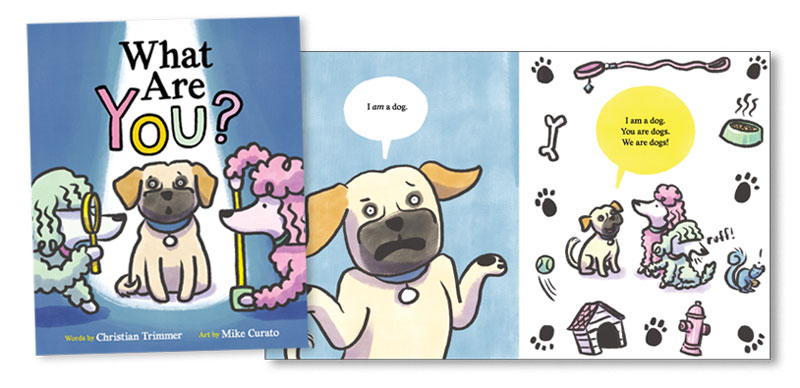“What Are You?” Christian Trimmer on Growing Up Biracial
What Are You? author Christian Trimmer shares what it was like to grow up as mixed race—Asian and white—and how to help multiracial kids address their questions of identity.

Related ArticlesRecent Award Books by AAPI Authors, Paired With Their First Novels |
Kids face questions on the regular. “Did you brush your teeth?” “Do you need to go the bathroom?” “What do you want to be when you grow up?” I answered those questions a lot, but another stands out in my memories: “What are you?” It’s a question I’ve fielded throughout my life, related to my mixed-race identity.
What Are You? is also the name of my new picture book, a story about a puggle, two poodles, and that question.
For many, it’s triggering. Hearing it, you instantly feel othered, like you don’t belong. You try to figure out how you might change things about yourself to belong.
Self-identifying mixed-race people make up a small percentage of my generation, yet they constitute the largest demographic among Americans under 18. Unfortunately, kids who identify as multiracial are at higher health and behavior risks. There was a moment I considered changing my title—did I really want to put this charged sentiment on the cover of a book? But I want to change the narrative. And I’m eager for kids to have a different relationship with the question.
My mother grew up in Vietnam. She met my father, a white man from Ohio, during the Vietnam War. They married in 1971 and settled in a predominantly white Chicago suburb. Until I left for college, my two brothers and my half-sister were the only people I knew who were also mixed race, not that we ever talked about it.
 My parents divorced when I was five, and I split my time between them. With my dad, I rarely thought about race. In our white community, I could blend in. Still, I was reminded of my otherness when the question came up. In fifth grade, a kid commented on my math test, on which I got 100 percent. “You’re only good at math because you’re Asian,” he said. I was silenced. Was I good at math because of my Vietnamese heritage?
My parents divorced when I was five, and I split my time between them. With my dad, I rarely thought about race. In our white community, I could blend in. Still, I was reminded of my otherness when the question came up. In fifth grade, a kid commented on my math test, on which I got 100 percent. “You’re only good at math because you’re Asian,” he said. I was silenced. Was I good at math because of my Vietnamese heritage?
Things were different with my mom. I moved in with her full-time when I was 12. The casual vibes of my dad’s place were replaced by strict rules, early curfews, and aggressive schedules. I was suddenly living the stereotypical life of an Asian American teen, and I resisted. I dreaded going to Diho Market, the local Asian food store, and to Chicago’s Little Saigon. Having been showered with images of whiteness that told me whose lives mattered most, I tried to distance myself from my Asian heritage. But I couldn’t. I felt like an imposter, having none of the markers that “defined” Asian American identity. I didn’t speak Vietnamese. We didn’t celebrate Vietnamese holidays. My mom cooked Vietnamese food, but that was her food.
And I felt compelled to “pick a race,” which can really mess with your head. “As a society, we think in either-or categories,” says Sarah Gaither, assistant professor of psychology and neuroscience at Duke University. “You can’t be two things at the same time.” I mentally checked the box for “white,” which necessitated burying a lot of the uncertainty and confusion I had about being biracial.
I wanted to fit in with white society—and I would, for long stretches. On the occasions I was “othered” by white friends, colleagues, romantic partners, and strangers, I’d chuckle along while my cheeks burned.
My limited sense of what it meant to be Asian American kept me from looking for community there. I have felt my racial identity most keenly in dating situations. It was either “I hope I’m Asian enough” for guys who were into Asian men or “I hope I’m white enough” for others. I failed to consider that I wanted to be seen and accepted for my full self.
There’s good news: “Researchers show that multiracial identity increases an appreciation and empathy for cultural diversity among others,” writes psychologist Astrea Greig.
That merits celebration. Let’s make sure our mixed-race children get guidance to navigate a world that wants to put them in boxes. I wrote What Are You? as part of my healing process. Some kids will inevitably be asked, “What are you?” Help them come up with an answer they feel good about.
Christian Trimmer is a children’s book author and editor.
RELATED
The job outlook in 2030: Librarians will be in demand
The job outlook in 2030: Librarians will be in demand
ALREADY A SUBSCRIBER? LOG IN
We are currently offering this content for free. Sign up now to activate your personal profile, where you can save articles for future viewing






Add Comment :-
Be the first reader to comment.
Comment Policy:
Comment should not be empty !!!